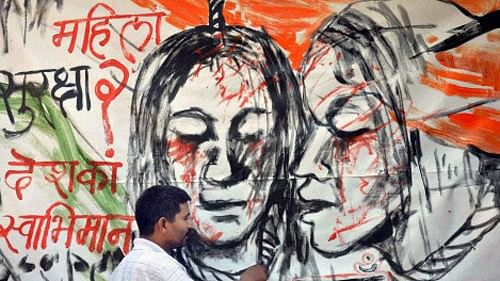
An artist draws a painting raising issues of women safety, in Moradabad.
Credit: PTI photo
New Delhi: In the run-up to the Lok Sabha polls, the discourse surrounding women's issues has garnered renewed attention with the slogan of 'Nari Shakti' but several activists are apprehensive that the core concerns of women may again get subdued in the broader economic and political debates.
There is a need for political parties to prioritise gender-sensitive policies, not merely as token gestures but as integral components of their core agendas, Poonam Muttreja, executive director of the Population Foundation of India (PFI) said, criticising the 'marginalisation' of women's issues within the broader electoral discourse.
"To truly empower women and address their unique concerns, it is imperative that political parties and leaders integrate gender-sensitive policies into their core agendas and manifestoes as a priority."
"This includes not only increasing women's representation in political spaces but also ensuring that their voices are heard and acted upon in decision-making processes," she said.
"We need more women in the Cabinet of ministers and other important government offices," she told PTI.
The long-pending women's reservation bill was passed in Parliament last year, and that has given a glimmer of hope to the women.
Seema Bhaskaran, Gender Lead at NGO Transform Rural India, underscored the importance of political agency enhancement through measures like the Women's Reservation Bill.
She pointed to examples from other countries like Rwanda, where such legislation had led to significant strides in gender equality in politics.
"Rwanda's 2003 Constitution set a 30 per cent quota for women in elected positions, and 10 years later the country became the world's leader for gender equality in politics," she noted.
Dolly Verma, a sarpanch from Gaya in Bihar, said women from all walks of life might not have representatives in Parliament right away, but the Bill will support them in a real democracy.
"I have been in local governance as a woman sarpanch for the last two terms. I must say that leadership positions not only help women but also the society because women are great leaders," she said.
Elaborating on her journey, she said the challenges faced by elected women representatives, particularly in rural areas where patriarchal norms often dictate political dynamics.
Talking about her campaign, Verma said it was against the sidelining of women sarpanches by their male counterparts that sheds light on the pervasive gender inequalities that persist within local governance structures.
She said since Indian society is 'deeply patriarchal', many can't even imagine women as political leaders and elected representatives.
"This social attitude will change only when we have more strong and independent women politicians and ministers. I am hopeful that with more girls becoming educated, even in rural areas, they will become more politically aware of their own rights. I am sure that change will come, if not today, in the near future," she added.
Despite sporadic increases, the percentage of women MPs has remained relatively low over the years, with the highest proportions recorded only in recent years.
The percentage of women representation in Lok Sabha remained about five till the 1970s and it was only in 2009 that it could reach a double-digit figure.
Women's representation in Rajya Sabha has been slightly lower than in Lok Sabha, not yet crossing 13 per cent of the total membership of the house since 1951.
Even in terms of candidates who are fielded for the polls, their numbers remain less than 20 per cent. The last Lok Sabha elections saw 724 women candidates out of a total of 8,049 for 550 Lok Sabha seats.
Congress fielded a maximum of 54 women candidates in the 2019 polls. It was closely followed by the ruling Bharatiya Janata Party (BJP), which had fielded 53 women.
Among the other parties, the Bahujan Samaj Party (BSP) fielded 24 women candidates, the All India Trinamool Congress (AITC) 23, the CPI(M) 10, and the CPI four, while the Nationalist Congress Party (NCP) fielded one woman candidate.
As many as 222 women contested the polls independently in the last general elections.
While the issue of women empowerment has been a major talking point of almost all political parties during elections, the core concerns of women often find themselves relegated to the sidelines amidst broader economic and political debates, activists said.
Even in the poll manifestoes of 2019 of major political parties, including the BJP and the Congress, it was seen that they reflect their professed commitments to women's empowerment and gender equality.
Both the BJP and the Congress have pledged to enact legislation ensuring a certain percentage of seats for women in legislative bodies.
The BJP manifesto emphasised the need for women-led development and outlined various measures aimed at enhancing women's participation in the workforce and ensuring their safety and dignity.
Similarly, the Congress manifesto pledged to prioritise women's rights and empowerment through legislative reforms and social welfare programmes.
Even this time in Lok Sabha polls, it is expected the topic of 'Nari Shakti' is going to be the centrepiece of the narrative but it is to be seen whether political parties will go beyond the rhetoric and take concrete steps to address the pressing concerns of women across the country.
As Muttreja said the real test of its impact will lie in the actual implementation and the extent to which it influences the prioritisation of women's issues in the political landscape of India.
"In the meantime, as we move towards the next elections, it is crucial to observe whether political parties will demonstrate their commitment to gender equality by allocating a significant number of tickets to women candidates," Muttreja said.